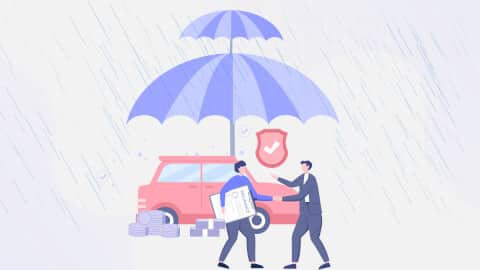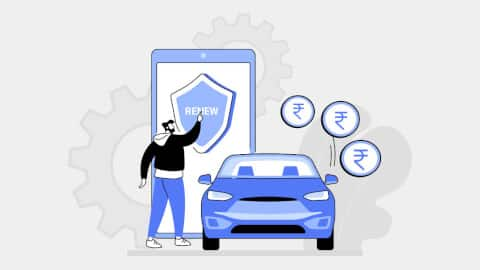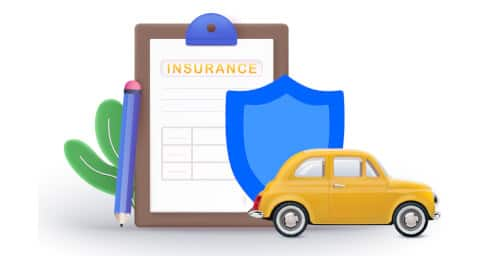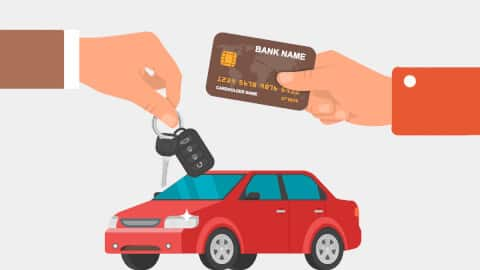1
Feeling Inadequately Insured? 3 Ways To Extend Your Health Insurance CoverDecoding Insurance
NiveshKarBefikar With Sajja Praveen Chowdary: Usage Based vs Traditional Cover
In the post Covid-19 world, more and more people are preferring to stay at home and practice social distancing. They are using their vehicles for essential purposes only. The motor insurance industry has stepped up and brought innovative products in the market for consumers such that they can save their premiums depending upon the usage of their cars.
In continuation of its consumer awareness initiatives, Policybazaar organized Motor Insurance: Usage-Based vs Traditional Cover Webinar under its Nivesh Kar Befikar series. The webinar was hosted by Vivek Law, Founder, and editor-in-chief of The MoneyMile, who spoke to Sajja Praveen Chowdary, Head, Motor Insurance, Policybazaar. Here are the edited excerpts from the Q&A session:
Q. Can you explain what the ‘pay per use’ concept is all about? How does it work? Who should opt for this?
Currently, if you look at the way motor insurance is structured in India, everyone who has a similar car pays the same premium if you are located in the same city. Let’s take an example. A person staying in Delhi having Honda City which was registered in 2016 and let’s say I also stay in Delhi and have a Honda City which is registered in 2016. Predominantly, I will give the same premium as that person too. Insurance companies use a few parameters to price the premium of cars. One is the age of the vehicle, model of the vehicle, whether you claimed last year or not, Regional Transport Office (RTO), your location, Insured Declared Value (IDV). As you can see, there is nothing related to my behaviour per say in the entire pricing mechanism. Assuming that Vivek and I stay in the same city and we both have the same vehicle, then both of us are going to end up paying the same premium which might not be the right way to price. Vivek might be driving less and I might drive a lot more which means Vivek is a low risk for the insurance company and Sajja is a high risk for the insurance company.
That’s where usage-based insurance comes into the picture. It tries to give the benefit to the users who are low risk to the insurance company and tries to adjust the pricing based on the users who are at a higher risk. There are multiple ways through which you can do this. One of the ways in which usage-based insurance has come is Bharti AXA policy, Bajaj Allianz and TATA AIG wherein you have km based pricing. Let’s assume if I were to pay Rs 10,000 for a policy in a year, I can opt for a policy that can limit me to drive 2500 kms a year, 5000 kms a year or 7500 kms a year. So, I might end up paying Rs 6000 premium or Rs 7000 or Rs 8000 premium instead of paying Rs 10,000. This is one of the ways usage-based insurance may seem today where the customer pays on the basis of the number of kms he/she is going to drive in that year.
The second way is pricing the policy only on the basis of the number of days the customer drives. That’s what is the Edelweiss Switch policy which comes under pay as you drive category. This policy ensures that you can turn on and turn off insurance for that particular day on the basis of whether you are driving or not. In general, in motor insurance policies, there is third party insurance and an own damage component. Edelweiss policy is own damage policy which takes care of damages to your car. So, you get to pay an X amount of premium upfront. Instead of paying Rs 10,000 premium, you might be asked to pay Rs 2000 premium upfront, and then that Rs 2000 will have an advance of 60 days of driving as you will drive for 60 days in a year.
Let’s assume if you drive only for 60 days given the Covid-19 situation, you actually need not pay anything else apart from Rs 2000. When you cross those 60 days, they will charge you Rs 20 per day, for an example, so apart from those 60 days, you drive 100 days more, you might just end up paying Rs 4000 as premium instead of Rs 10,000 premium.That’s how usage-based insurance works where it basically takes into consideration the risk as a factor in terms of the number of kms that you drive or the number of days you are going to drive. Definitely, that’s one of the important factors when you look at claims data per se. Consumers can benefit through this because they are going to pay what their risk is worth.
((relatedarticle_1))
Q. When will usage-based insurance come into effect? Will it be applicable for third party insurance as well?
- From Gaurav Bhansali
Usage-based insurance has already come into effect as part of the Insurance Regulatory and Development Authority of India’s (IRDAI) regulatory sandbox framework. IRDAI came up with sandbox rules last year under which insurance companies can introduce new product lines that aren’t existing today and they will be in place for the next year. Based on the experience of these products, insurance companies will be allowed to make these products available for the consumer full-fledged.
Usage-based insurance has been available in the market since April. It will be available for the next year until IRDAI sees that these plans are going well.
Edelweiss Switch is an own damage only policy which means it will only cover your car from accidents, fire, and theft.Third-party insurance is mandatory by law and it's an annual policy. When it comes to Bharti AXA, Bajaj Allianz, or TATA AIG policy, these are comprehensive policies which means they have two components. One is own damage component and the other is a third-party component. The premium of the third party component is decided by the regulator. So, if you are paying Rs 10,000 as premium, Rs 3,000 will go to third party insurance and Rs 6,000 will go to own damage policy. Rs 3,000 will remain constant and Rs 6000 is getting discounted. As a result, you are going to pay Rs 3,000 plus 50% of Rs 6000. So, you end up paying Rs 6000. So, your third party insurance is covered for the entire year irrespective of how many kms you drive. For example, in Bharti AXA policy, if I have opted for paying Rs 6000 instead of Rs 10,000 and taken 2500 kms slab, I will be covered upto 2500 kms for any kind of damage that will happen to my car. For third party insurance, there is no limitation with kms. If you don’t drive more than 2500 kms the entire year, then in Rs 6000, you are covered for own damage as well as third party insurance cover.
Let’s assume six months down the line, you realize that you will drive more than 2500 kms, so I might drive 5000 kms in a year. You can go to Bharti AXA and ask them to endorse your policy to 5000 kms. They might charge you Rs 1000 or Rs 1500 extra but will endorse 5000 kms. If an accident happens crossing 2500 kms, your own damage component doesn’t go away. Your car is taken care of. To give an example, you start a policy in August and finish off 2500 kms in November, and you don’t go to Bharti AXA to get your policy endorsed, in the month of January, an accident happens, your policy will cover third party insurance but it won’t take care of own damage cover of your car.
Q. Can existing users migrate to usage-based insurance?
—From Gaurav Bhansali
Unfortunately no. This is a part of sandbox regulations. These kinds of policies are only available in case you have an insurance policy that is expiring and you want to take a new policy or you have bought a new car and want to get it insured. All motor insurance policies have a clause in which if you have an alternate policy, you can cancel your existing policy but that’s a very tedious process. We won’t suggest you do it. We suggest you migrate to these policies as and when your policy is up for renewal.
Q. Anyone who is not using the vehicle beyond 7,500 kms a year, this may be a good option? Is that a good cut off where you stand to benefit if you are not driving too much?
For the first category of products which are km based pricing, if you are not going to drive more than 7,500 kms per year, they should opt for this policy. If you are going to drive more than 7,500 kms per year, it might be good to continue using your existing policy.The second category is the Edelweiss Switch policy where you can turn on and turn off your own damage component. It will be beneficial for people who don’t drive every day in a year. Let me take an example of people who might stay in Mumbai or Delhi. In Mumbai, most people commute to their offices through local trains on weekdays and use cars for a long drive or going out with family on weekends only. Similarly, in Delhi, a lot of people commute through the metro the entire five days a week and use their vehicles on weekends only. So, you end up driving only 100 days out of 365 days in a year. The vehicle stays in your garage for the rest of the 265 days. So, you end up paying only for those 100 days through this policy and not the rest of 265 days. As a result, you save a lot of premium. So, there are both the categories, you need to decide what suits you the best.
((calculator))
Q. Will all the insurance companies provide this policy or just private players?
—From Ajeet
This is under sandbox regulations and IRDAI has asked insurance companies to apply. There are various companies that have applied and accordingly, IRDAI has evaluated those proposals and have permitted insurance companies. Right now, the majority of products are from private insurers only especially the usage-based insurance. The first category of product which is per km basis pricing is available for Bharti AXA, TATA AIG, and Bajaj Allianz. Switch on and switch off policy is available for Edelweiss General. I don’t think any of the PSUs have launched this product. It's not mandatory that you have to launch this product.
Q. What has been the impact of Covid-19 for overall motor insurance space in the last four months? We saw that vehicle sale were stand-stilled. Though, we are seeing growth in the last two months.
—From Pruthvi Reddy
The motor insurance industry was fine till March. However, once Covid-19 hit, in April, people realized that they wouldn't take out their vehicle. As a result, they stopped renewing their policies and sales went down drastically. By mid-May, when unlock happened, we started to see people purchasing policies. In June, business bounced back to pre Covid levels. People started renewing policies at least for private cars and two-wheelers. However, on the brand new vehicles side, showrooms were not open and vehicles were not being sold. There was also a hit on the manufacturing side. So, the segment of brand new vehicles has taken a hit and is still slow compared to pre-Covid levels.
Q. Up to what time does the insurance company issue zero debt policy for a car from the date of manufacture?
—From Mahadev Jadav
Every insurance company has its own rule. Some people consider it a manufacturing year whereas some people consider it a registration year. Most of the companies provide anywhere between 3-5 years. There is a whole set of insurers who give up to 3 years. Half of them extend till 5 years. Only 3-4 insurers issue a zero debt policy for a car up to 10 years. 70% of users opt for up to 3 years, while only 40% of users opt for zero depreciation between the fourth and fifth years of the vehicle. After 5 years, hardly 5% of users opt for zero depreciation.
Q. What age of the car should one buy third party insurance?
—From Balkesh
You need to have third party insurance for driving a vehicle legally on the road. A comprehensive policy comes with a third party cover and an own damage cover. You can buy only third party cover also. Coming to your question, in case if you are asking when do you switch from a comprehensive policy to a third party only policy, that completely depends on your comfort. We see very few users who buy third party only policy even in the first year of purchase too. Generally, institutional owners, who think that their vehicle is going to run in the boundaries of school or college, end up buying a third party only policy. Generally, people tend to buy third party only policy in the seventh year of the vehicle when they realize that there aren't going to be many accidents. People are fine with having few dents and scratches on the car as compared to the first or second year when you want the car to be superbly clean. Having said that, this is broadly what the market looks like but again it depends on your comfort.
Q. I am a first-time buyer of motor insurance. Any tips or suggestions for me as to how I should go about choosing one for my Hyundai i10 vehicle?
—From Rahul Vishwakarma
There are multiple options available. There is a third party policy that is mandatory for vehicles. There is a comprehensive policy which is a combination of third party policy and own damage cover. There are add on covers that you can buy along with your comprehensive policy. It depends on what kind of risk that your vehicle has. I would definitely recommend a comprehensive policy. Having an add on cover depends on your needs. Let’s say if you drive very less and you think that the car won’t have any scratches or dents, then you need not take an add on cover. You can only choose a comprehensive policy. But if you are in a city where accident risk is higher, you should have a zero depreciation add on. It helps you in ensuring that if there are parts that are being replaced in your car when a claim comes up, there is no depreciation deducted on those parts. Otherwise every part ages and with age, there’s a depreciation that is taken into consideration. Insurance companies also provide a roadside assistance add-on. This kind of add on helps if your car is stuck in the middle of the road due to an accident or there is a flat tyre and you need some help to jump-start the battery, toe your car to the local garage, etc. Apart from that, there is an add on to the engine protector which you might want to add in case you are living in a low lying area where there might be frequent water flooding.
Q. How can I make sure that my claim payment is on time? What should I do if it's not?
—From Amit Kumar Deshwal
I will just step back and suggest to all the viewers that in case of a claim, gone are the days when we used to figure out the nearest garage and get the documentation done. Insurance companies have come up with wonderful processes that customers can take advantage of. They have become technologically advanced over a period of time. My suggestion is in case of a claim or an accident, instead of going to a garage nearby, you should inform the insurance company through its claims toll-free number. That’s the foremost thing to do because a lot of companies give roadside assistance service which means they would pick the car and take it to the garage if required or there are also companies that have to pick up and drop service. Let’s assume your car got a small dent but you drove it back to your home and then you want to claim it. Most of the companies have a pickup and drop feature where they would pick up the car from your house, take it to the garage, get it repaired, get the documents signed by you, get the claim paid and get the car dropped back to your house. So, you need not worry about it.
A lot of insurance companies also offer you money upfront so that you can get it repaired wherever you want to. Let’s assume you had an accident on a weekday and it might not be possible for you to commute without a car which means you don’t want to spoil one day in getting the dent repaired. You can upload the video or picture using your insurer’s app. That is why I am saying to call the insurance company because they will understand your case and suggest the best possible ways. They will see the video and give money and ask you to get the car repaired. They will tell you to submit the bills once it's repaired. If you agree, they will transfer the money instantly into your account. So, you can get your car repaired whenever you want to. There is an overnight service given by HDFC Ergo. Let’s assume you had a small accident, up to 3-4 scratches, or a part replacement needs to be done. They will pick up your car in the evening around 6 pm or 7 pm, get it repaired overnight, and tomorrow morning before 9 am, they will deliver the car at your home before you go to the office. So, you need not worry about ever losing a single day. You should speak to the insurance company to take advantage of these kinds of processes.
Coming to the second part, let’s assume that you have submitted for reimbursement and it's not happening timely. There are various possible reasons why it might happen. You might have submitted the claim at a local office. Given the Covid-19 situation, there are a lot of places where they are operating at less strength. But a lot of insurance companies have a centralized claims toll free number. So, you should call them and put across what happened and that you aren’t getting a response. Recently, IRDAI has asked insurance companies to provide timely claim service updates to consumers. Customers are entitled to get what is happening with their claim, when is it going to get settled, what is the next step. Insurance companies should upfront communicate to the customer from time to time. If that’s also not happening, there is an escalation mechanism on the insurance company’s website and if you put across to them, they should be able to solve it. I think some delays in reimbursement used to happen in the past but with the advancements and new processes that are in place, a lot of these issues can be driven away with. You don’t even get into the reimbursement process. You can just call up the insurer and they will suggest the best process for you.
Q. What is the benefit of buying motor insurance online?
—From Chanakya
It's not just about motor insurance, it's about everything. In a highly regulated sector like insurance when you go online, everything is clearly written in black and white. So, if you are buying something, you know exactly what you are buying as compared to offline. In a few offline scenarios, not just in insurance, the person who's selling might promise you something else which isn’t actually part of it. So, you can avoid that situation online. Secondly, you get to compare multiple insurance policies at a single place as compared to approaching various people and comparing products. Especially a platform like Policybazaar where you can compare all 25 insurance companies' policies and decide what kind of a tailor-made policy you want. Generally, if you are buying from a particular person, then there is a package made and those are being put across. But if you look online, you can look at various options, various companies, which kind of add on you want and which you don’t. Also, in online selling, insurance companies are trying to make the best available space and put their best foot forward in terms of price.
Q. I have renewed my motor cover which I have purchased online but it isn’t reflecting. How do I go about the same?
—From Abhijeet Chatterji
If I have correctly understood, you have purchased a policy but it isn’t reflecting on the Parivahan app. That’s what I am assuming. If that is the scenario, you can call up the insurance company and report it saying that it’s not reflecting. They will confirm whether it's a valid policy and by when they will reflect it. The reason it might take time to reflect on the Parivahan website is that the process goes through multiple loops. Insurance companies put this data to the Insurance Information Bureau of India and then they put the data across to Parivahan. Hence, it takes some time. In case it got stuck during this process, you can report it to the insurance company and get it done. If you are referring to something else, for example, you bought the policy online through someone but it doesn’t reflect in the insurance company’s website, you should speak to the insurance company and they will help you resolve it if it's a genuine policy. You should also understand that there are fraudsters in the industry who try to take advantage of consumers. So, if someone sends you a link, you should validate whether the company is registered with IRDAI or not and then only make payment.
Q. Any tip you would like to suggest while renewing the car insurance policy?
—FromTanvi
It's not just about car insurance, it's about any insurance. You should do a bit of homework and compare different policies before opting for it. There are 25+ general insurance companies and 20+ life insurance companies offering different products with different benefits. In order to get the best of what you want, you should compare various policies.
Q. Is usage-based insurance for trucks available?
—From Pankaj Toli
I don’t think so. Right now, all of these products are primarily from the perspective of sandbox regulations and almost all insurers have filed for private cars as this is in the initial stage. But yes, we may expect such products to be available in the future for trucks. In case, you have a commercial vehicle and you don’t want a comprehensive policy, let’s assume that your vehicle will remain in the garage for a year because of Covid-19. So, the only risk your vehicle can have is fire and theft. There are policies that cover vehicles staying in a garage where you pay a very small premium which covers fire and theft risk. So, you need not have third party insurance. You can discuss this with your insurer.













